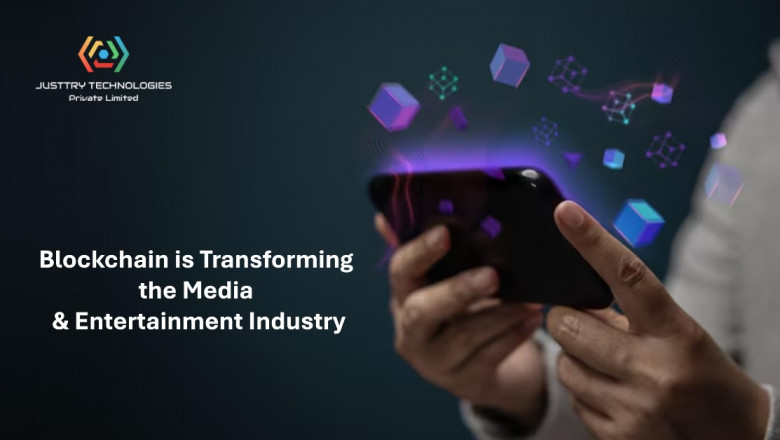views
1. Introduction
Let’s face it: the media and entertainment world has been through a lot. From old-school film reels to Netflix marathons, the industry has evolved fast—but not always fairly. Enter blockchain technology. This digital game-changer is rewriting the rules of who owns what, who gets paid, and how fans interact with content.
2. The Evolution of Media in the Digital Age
We’ve gone from vinyl records and VHS tapes to Spotify and streaming giants. This digital transformation brought convenience, but also chaos—piracy, complex licensing, and unclear revenue splits. Creators are often left in the dark about who’s profiting off their work. Sounds unfair, right?
3. What is Blockchain Technology?
Imagine a massive public ledger that nobody can tamper with. That’s blockchain. It’s a decentralized, secure system where every blockchain transaction is time-stamped and verified by the network. With smart contracts, deals can be automated. With tokenization, digital assets are truly owned.
4. Why Media & Entertainment Needs Blockchain
The industry is plagued with middlemen, confusing royalties, and fake copies. Blockchain promises clarity. Whether you're a filmmaker, musician, or gamer, you can now own, sell, and license your work on your own terms—with a system that backs you up.
5. Use Case 1: Copyright Protection and Content Ownership
Let’s say you’re an indie musician. You drop a new track online—who says you created it first? Blockchain gives you that proof. It creates a digital fingerprint of your work with a time-stamp that can’t be edited. Boom—undeniable proof of ownership.
6. Use Case 2: Transparent Royalty Payments
Royalties are messy. Artists wait months for payments. With blockchain’s smart contracts, payments are instant once the content is used. Platforms like Audius and Mycelia are already doing this, cutting out unnecessary middlemen and ensuring everyone gets their fair share.
7. Use Case 3: Combating Piracy with Blockchain
Piracy drains billions from the industry every year. Blockchain can track every instance of media usage. Think of it like a digital GPS for your content. Every copy, view, or download is logged and traced, making unauthorized sharing way harder.
8. Use Case 4: NFTs and Digital Collectibles
Ever bought a signed vinyl or a collector’s edition DVD? Now imagine that, but digital. That’s what NFT platforms offer. Artists mint exclusive digital items that fans can own, trade, or collect. No fakes. No copies. Just verified ownership.
Real-World Example: Musicians and NFT Drops
Artists like Kings of Leon and Grimes have released NFT albums and art. Fans get exclusive access, merch, or even concert perks. It’s a new revenue model that’s direct, personal, and built on value—not ads or streams.
9. Use Case 5: Fan Engagement and Direct Monetization
Why rely on sponsors or third-party platforms when you can monetize directly? Blockchain enables fan tokens, exclusive content, and voting rights. It’s like a Patreon with superpowers. Fans become investors in your success.
10. Use Case 6: Blockchain in Gaming and Virtual Worlds
Gaming is a goldmine for blockchain. Players spend real money on in-game skins and items. Now, these can be real digital assets on the blockchain—owned, traded, and even used across games. The rise of blockchain mobile app development is fueling this evolution.
11. Blockchain Development Services Powering This Shift
Behind the scenes, specialized blockchain development services are building the apps, marketplaces, and infrastructure. These pros ensure that the systems are scalable, secure, and tailored for creative industries. Without them, this transformation wouldn’t be possible.
12. Blockchain Transactions and Content Provenance
Ever wondered if that viral video was real or edited? Blockchain can prove it. Every content piece can be traced back to its source, including edits and changes. That’s what we call provenance—and it’s key in journalism and digital art.
13. Benefits of Blockchain in Media
-
Transparency: Everyone knows where money goes
-
Security: Tamper-proof records
-
Efficiency: Smart contracts remove delays
-
Empowerment: Artists take back control
No wonder the industry is taking notice.
14. Challenges to Adoption
But it’s not all sunshine and smart contracts. Blockchain still faces:
-
Scalability: Networks need to handle massive loads
-
Costs: Some platforms are expensive to use
-
Regulation: Legal clarity is still evolving
-
Awareness: Not everyone gets blockchain yet
15. The Future of Blockchain in Media & Entertainment
So, what’s next? Expect deeper integration with AI-generated content, virtual reality, and the metaverse. Blockchain will underpin entire ecosystems—where creators own worlds and fans help shape them. It’s not just evolution; it’s a revolution.
16. Conclusion
Blockchain isn’t just transforming media and entertainment—it’s liberating it. From fairer royalties to direct fan interaction and real content ownership, this tech is redefining creativity and connection. The only question is—are you ready to be part of this change?






















Comments
0 comment